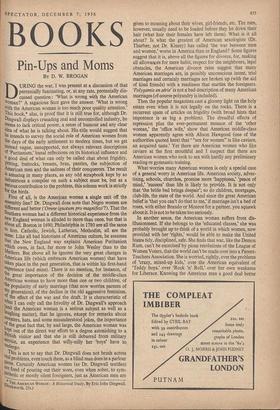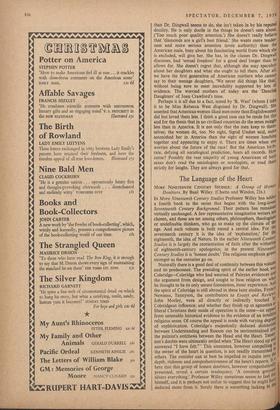BOOKS
Pin-Ups and Moms
BY D. W. BROGAN 111) URING the war, I was present at a discussion of that perennially fascinating, or, at any rate, perennially dis- cussed question: 'What is wrong with, the American woman?' A sagacious Scot gave the answer. `What is wrong With the American woman is too much poor quality attention.' This book,* alas, is proof that it is still true for, although Dr. Dingwall displays crusading zeal and uncontrolled industry, he seems to lack critical power, a sense of humour and any clear idea of what he is talking about. His 'title would suggest that he intends to survey the social role of American women from the days of the early settlement to modern times, but we get instead vague, unsupported, not always relevant descriptions Of `Puritanism,' banal reflections on its historical influence and a good deal of what can only be called chat about frigidity, Petting, buttocks, breasts, bras, panties, the subjection of American men and the sadness of their conquerors. The result is amusing in many places, as any odd scrapbook kept by so industrious a compiler on such a subject must be, but as a serious contribution to the problem, this solemn work is strictly for the birds.
First of all, is the American woman a single unit off the assembly line? Dr. Dingwall does note that Negro women are different and better ('Omne ignotum pro magnifico'?). That the Southern woman had a different historical experience from the new England woman is alluded to more than once, but that is about all. Boston in 1690, Philadelphia in 1780 are all the same to him. Catholic, Jewish, Lutheran, Methodist, all are the same. Like all bad historians of American culture, he assumes that the New England way explains American Puritanism Which owes, in fact, far more to John Wesley than to the mathers. But above all he ignores the very great changes in American life (which embraces American women) that have taken place in the past generation, that is within his first-hand experience (and mine). There is no mention, for instance, of the e great importance of the decision of the middle-class the woman to have more than one or two children, of e Popularity of early marriage (that now worries parents of In,Y generation), of the decline in the old aggressive feminism, °I the effect of the war and the draft. It is characteristic of What I can only call the frivolity of Dr. Dingwall's approach (and the American woman is a serious subject as well as a laughing matter), that he ignores, except for remarks about sweaters, hats, and some misunderstood jokes, the importance ?f the great fact that, by and large, the American woman was kept out of the direct war effort to a degree astonishing to a ritish visitor and that she is still debarred from military service, an experience that willy-nilly her 'boys' have to Undergo. r This is not to say that Dr. Dingwall does not brush across ,,eal problems, even touch them, as a blind man does in a parlour game. Certainly American women (as Dr. Dingwall testifies) „r_.° fond of pouring out their woes, even when sober, to sym- y4Ibetic or merely silent foreigners, just as American men are ,_ (1) HEA wortMEh, 2RI5s.) CAN WOMAN : A Historical Study. By Eric John Dingwall. Lick given to moaning about their wives, girl-friends, etc. The men, however, usually need to be loaded before they let down their hair (what hair their females have left them). What is it all about? Is what the greatest of American sexologists (Dr. Thurber, not Dr. Kinsey) has called 'the war between -men and women,' worse in America than in England? Some figures suggest that it is, above all the figures for divorce, for, making all allowanices for mere habit, respect for the neighbours, legal obstacles, the American divorce rates suggest that many American marriages are, in possibly unconscious intent, trial marriages and certainly marriages are broken up (with the aid of kind friends) with a readiness that startles the foreigners. Polygamie en serie''is not a bad description of many American marriages (of course polyandry is included).
Then the popular magazines cast a gloomy light on the holy estate even when it is not legally on the rocks. There is a recurrent spate of articles on frigidity (with broad hints that impotence is as big a problem). The dreadful effects of repression plus the ever-permanent menace of the 'other woman,' the 'office Wife,' show that American middle-class women apparently agree with Alison Hawgood (one of the authorities quoted here) that ' "sex for women" is like caviare, an acquired taste.' Yet there are American women who like caviare at the first mouthful and I suspect that there are American women who took to sex with hardly any preliminary reading or gymnastic training.
What'worries many American women is only a special case of a general worry in American life. American society, adver- tising, schools, churches, promise more `happiness,' peace of mind; `success' than life is likely to provide. It is not only that 'the bride bed brings despair'; so do children, mortgages, club-life, the state of the world. And since the great American belief is 'that you can't do that to me,' if marriage isn't a bed of roses, with either Brando or Monroe for a partner, you squawk about it. It-is not to be taken too seriously.
In another sense, the American woman suffers from dis- illusionment. If she belongs to the 'educated classes,' she was probably brought up to think of a world in which women, now provided with her 'rights,' would be able to make the United States tidy, disciplined, safe. She finds that war, like the Demon Rum, can't be exorcised by pious resolutions of the League of Women Voters, that the world can't be made over into a Parent- Teachers Association. She is worried, rightly, over the problems of 'crazy, mixed-up kids,' over the American equivalent of 'Teddy boys,' over 'Rock 'n' Roll,' over her own weakness for Liberace. Knowing the American man a good deal better
than Dr. Dingwall seems to do, she isn't taken in by his reputed docility. He is only docile in the things he doesn't care about. ('Too much poor quality attention.') She doesn't really believe that 'diamonds are a girl's best friend.' She wants more tender' ness and more serious attention (even authority) than the American male, busy about his fascinating world from which she is excluded, will give her. She has, in the classes Dr. Dingwall discusses, had 'sexual freedom' for a good deal longer than he allows for. She doesn't regret that, although she may speculate about her daughters and what she ought to tell them. After all. we have the first generation of American mothers who cannot say to their teenage daughters, 'We never did things like that; without being sure to meet incredulity supported by lots of evidence. The worried mothers of today are the 'Dancing Daughters' of Joan Crawford's time.
Perhaps it is all due to a fact, noted by 'R. West' (whom I take it to be Miss Rebecca West disguised by Dr. Dingwall). She asserted that. American women liked men more than Englishwomen did but loved them less. I think a good case can he made for this and for the thesis that in no civilised countries do the sexes mingle less than in America. It is not only that the men keep to them' selves; the women do, too. No sight, Sigrid Undset said, mote astonished her in America than the sight of women lunching together and appearing to enjoy it. There are times when one worries about the future of the race! But the American birth• rate, defying all sociological prediction, beats all records. How come? Possibly the vast majority of young Americans of both sexes don't read the sociologists or sexologists, or read the strictly for laughs. They are always good for that.



































 Previous page
Previous page